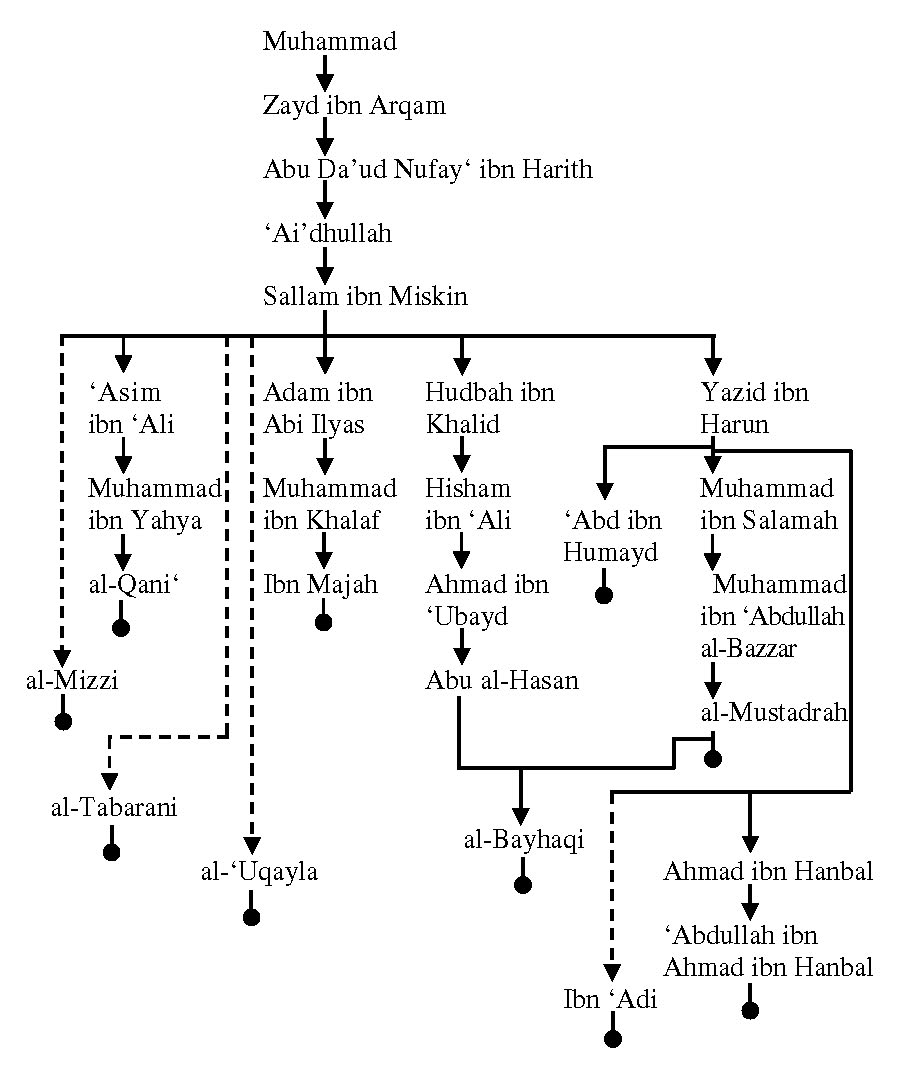حدثنا محمد بن خَلَفٍ الْعَسْقَلَانِيُّ ثنا
آدَمُ بن أبي إِيَاسٍ ثنا سَلَّامُ بن مِسْكِينٍ ثنا عَائِذُ
اللّٰهِ عن أبي دَاوُدَ عن زَيْدِ بن أَرْقَمَ قال قال أَصْحَابُ
رسول اللّٰهِ صلي اللّٰه عليه وسلم يا رَسُولَ اللّٰهِ ما هذه
الْأَضَاحِيُّ قال سُنَّةُ أَبِيكُمْ إبراهيم قالوا فما لنا فيها
يا رَسُولَ اللّٰهِ قال بِكُلِّ شَعَرَةٍ حَسَنَةٌ قالوا
فَالصُّوفُ يا رَسُولَ اللّٰهِ قال بِكُلِّ شَعَرَةٍ من الصُّوفِ
حَسَنَةٌ
Zayd ibn Arqam
stated that the companions of God’s Messenger asked him: “O
Messenger of God! What is the reality of these animal
sacrifices that we offer?” He replied: “This is the practice
of your forefather Abraham.” They asked: “What will we gain
from them, O Messenger of God?” He replied: “You will get one
unit of reward for every hair of that animal.” They then
asked: “What about the wool [of a ram]?” He replied: “For
every strand of wool you will get one unit of reward.”
Following is the schematic illustration
of the variants of this narrative’s isnad:

Regarding Nufay‘ ibn al-Harith, al-Mizzi
records: Yahya ibn Ma‘in says that he is nothing and concocts
narratives; ‘Amr ibn ‘Ali and al-Nasa’i say that he is matruk
al-hadith; at another instances, al-Nasa’i says that he is
laysa bi thiqah wa la yuktabu hadithuhu; Abu Zur‘ah says that
he is lam yakun bi shayy’; Abu Hatim says that he is munkar
al-hadith da‘if al-hadith; al-Bukhari says yatakallamun fihi;
al-Tirmidhi says that he is regarded to be da‘if in hadith;
Ibn Hibban says that he mistakenly narrates fabricated
narratives from trustworthy people and it is not permissible
to adduce from him.
Al-Daraqutni calls him matruk al-hadith
and Ibn Hajar regard him to be matruk.
‘A’idhullah al-Majashi‘i is majhul al-‘ayn
as the only person to narrate from him is Sallam ibn Miskin.
Moreover, al-Dhahabi records that according to al-Bukhari his
narratives are not correct and that Abu Hatim regards him to
be munkar al-hadith.
Ibn Hajar says that he is da‘if.
ـــــــــــــــــــــــــ
__________________
|